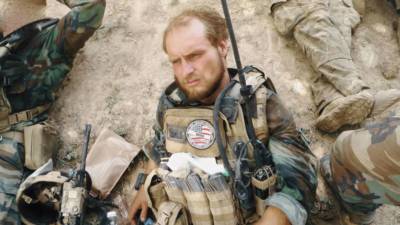ON SEPTEMBER 25, 2011, Kevin Flike, a 27-year-old Green Beret with the 1st Special Forces Group, was on patrol with his team in the mountains of northwestern Afghanistan when they found an enemy building — a house Taliban fighters were using to make improvised explosive devices. Flike was a combat engineer in the Special Forces. He blew up the bombs, but a 10-hour firefight unfolded. Pinned down and under heavy fire, a Taliban sniper shot Flike in the stomach, while Flike was running around the corner of a building. "It felt like getting hit with a sledgehammer," Flike recalls.
Every Minute Felt Like the Last
Flike was overwrought with pain. "I was using the little bit of energy I had left to stay conscious." Flike felt like every minute that went by was going to be his last. The battle continued, as Flike tried and failed to treat himself. "There was nothing I could do," he says.
One of the unique aspects of the U.S. Special Forces is that they work to build trust with natives of the country they are deployed into. They also train up their army. On this rotation, Flike knew that in combat, the soldiers fighting by his side would include elite fighters from Afghanistan's 5th Commandos group. It was one of these teammates that dragged Flike to a safer location. There the team medic frantically tried to help Flike. Soldiers he had deployed with before, to Afghanistan, Thailand, and the Philippines — guys who he says were stoically rare with anything resembling a complement — were telling Flike they loved him. "I was going to die," Flike recalls thinking.
It took 15 minutes to get Flike to the field hospital. The medic asked Flike if he had any questions.
"Am I going to die?" Flike asked.
"I'm not sure," the medic responded. "Any last requests?"
The underlying communication was clear. Flike asked for a priest.
A Second Chance
Flike was evacuated by helicopter. Four days later, he woke up in the intensive care Landstuhl, Germany, in the intensive care unit of Bagram Hospital.
The pain was so great Flike couldn't lift his head.
"I felt tremendous relief," he says. "I was alive. But at the time, I could not comprehend how difficult the coming years would be."
Flike's problems started with the physical: A fractured hip, loss of 20% of his colon, and a damaged femoral nerve. He would endure six surgeries marked by 40 inches of scars.
When the relief from not dying burned off, growing psychological and spiritual problems complicated the physical trauma: Depression, despair, addiction, anger, jealousy, and post-traumatic stress.
Wounded By War But Never Broken: Kevin Flike from TB12 Sports.
The Long Road
It was at Brooke Army Medical Center in San Antonio, Texas, where his wife, Kim, was finally able to be with him again. She would later say that her husband — multiple tubes jutting from his body — looked dead inside.
The sixth operation was an experimental surgery designed to repair nerve damage in the leg. To buffer the pain, Flike was prescribed twelve pills of Dilaudid, 12 morphine pills, and 2 Valium — daily.
Guilt marked his descent into depression. He felt like he was letting down his teammates, who remained on the battlefield.
His wife would catch him glassy-eyed and absent and try and snap him out of it. "You're in Afghanistan now, aren't you?"
Flike had managed to cut back on the pain pills, but the suffering deepened.
"I was a man who needed help putting on his socks," he says. "I was drinking during long, sleepless nights."
He knew rock bottom was near when he went three days and nights without sleep.
His wife challenged him. "Is this it? Is this what you're going to do for the rest of your life?"
The sixth operation was an experimental surgery designed to repair nerve damage in the leg. To buffer the pain, Flike was prescribed twelve pills of Dilaudid, 12 morphine pills, and 2 Valium — daily.
A Turning Point
When Flike gives talks to groups — including veterans struggling with the psychic wounds of war, he explains that the real turning point, following this challenge from his wife, was when he finally learned to ask for help. He opened himself up to trusting a Special Forces psychologist who knew the terrain Flike was desperately trying to navigate.
"It was then I realized I was not alone," Flike says. "It was then I learned how to ask for help and accept help."
The next stage of Flike's journey was applying for grad school. Knowing he responded best to extreme challenge, he pursued two advanced degrees simultaneously, at Harvard and MIT.
Some of the most useful self-revelation, Flike says, was earned while grappling with the advanced degree programs at two of the most venerable university institutions in the world.
"I had never wanted to quit something more," Flike says. "I had never worked so hard to attain below average results."
It was in this stage of his recovery when he realized the depth and magnitude of his injuries. When he began hunting for a job — rejected the first 16 times — he was able to sense what the enduring anger and jealousy was doing to him.
"I took a look at my character," he says. "I committed to letting go of my negative thoughts. I knew I would never be 100% healed, and I knew I needed always to be working at it."
Flike took up daily meditation, journaling, and yoga, practices he remains committed to.
"That was when I decided to forgive others; and I decided to forgive myself for the way I had acted and treated others."

Overcoming the Pain
He had persevered with the job search: Goldman Sachs hired Flike. It was during this time when he turned to confront another challenge, one magnified by the disappointing guidance he was receiving from doctors when he sought them out for help with the chronic pain. Pain that plagued his ability to walk upstairs. Pain that — on Christmas morning when his daughters were opening presents — forced him to lay on his back on the floor.
"The thing about chronic pain that many people don't realize is how much energy it takes out of you every hour of every day," he says. "I was only 32 and couldn't play with my kids on Christmas morning."
A co-worker at Goldman Sachs had been telling him, "You have to see Guerrero," meaning Alex Guerrero, co-founder of TB12 and Tom Brady's longtime body coach.
Flike went to the TB12 Performance & Recovery Center in Foxboro.
"The first thing I liked about TB12 is that rather than telling me all of the things I couldn't do, the Body Coaches were all about what I wanted to do. I told them I wanted to get rid of the pain. They told me that they would handle the pain, no problem. 'But what do you want to do?' I was asked. I said I wanted to run again."
The first treatment, to Flike's surprise, was a success. "Pain in my neck dissipated. I would move my head around in a way I hadn't been able to."
He continued to go back. The success continued, and Flike began wanting more of the approach.
"I was drinking too much coffee and not enough water," Flike says. "My diet had been OK, but I realized I had to tighten it up."
Through the holistic approach, inflammation waned and the pain melted away with it. Flike was eventually off all pain medication and muscle relaxers.
And in time he was back to running.
The return of his physical health was almost full-circle in nature when he went through the training to join the cadre of Go Ruck. Go Ruck is a company that employs Special Forces combat veterans to stage challenging training events similar in nature to Special Forces selection. For Flike, becoming part of the Go Ruck team included a 12-hour ruck event followed by a 6-hour event, for 40 miles worth of rucking in the mountains of Colorado.
Flike's return to running has also allowed him to take on a longtime dream: He'll be running the Boston Marathon to raise money with Team TB12 Foundation.

5 Life Lessons
In addition to Flike continuing to be a part of the TB12 community, he gives talks on the subject of resilience to veterans and non-veterans.
He tells his story and shares the key lessons he relied on to recover his life and his health:
- Take the hard road, it's worth it.
- Things happen for a reason.
- Live your life like you are going to die tomorrow.
- Don't feel sorry for yourself.
- Never give up.
The Green Beret Foundation
To learn more about Kevin, follow him on Twitter and Instagram (@woundedbywar) or on his blog, Wounded by War.
The Green Beret Foundation provides immediate and ongoing support to the Special Forces community and their families. To donate, visit the Green Beret Foundation.







